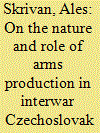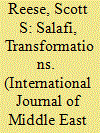|
|
|
Sort Order |
|
|
|
Items / Page
|
|
|
|
|
|
|
| Srl | Item |
| 1 |
ID:
172301


|
|
|
|
|
| Summary/Abstract |
Ranking alongside the top bicycling nations of the world, Japan today boasts of a deeply engrained cycling culture. While the technological prowess of Japan’s bicycle industry is well known, there exists no scholarly study investigating the socio-cultural impact of cycling in Japan, specifically its role in emancipation of women. How the modern women of Japan scaled barriers to mobility riding their way to modernity in an oppressive male-dominated society is not yet known. The objective of this paper is to examine women cyclists in Japan in the context of modernisation. On the one hand, viewing bicycles helps examine the Japanese economy from the perspective of ordinary women as active consumers (as against their passive image) whose demand for bicycles was certainly an essential ingredient for the growth of bicycle industry. On the other hand, it serves to question the predominant view of consumption stagnation in interwar Japan. Most importantly, as countries around the world continue to make laudable efforts to encourage women cyclists, a leaf can be drawn by policymakers from the history of forgotten cycling heroines of Japan to accelerate women’s socio-economic empowerment.
|
|
|
|
|
|
|
|
|
|
|
|
|
|
|
|
| 2 |
ID:
101057


|
|
|
|
|
| Publication |
2010.
|
| Summary/Abstract |
Arms production in interwar Czechoslovakia has been a fascinating subject to research. The development of Czechoslovak weapons production was remarkably interesting as it was influenced by many political, military, and economic factors. The arms industry was obviously a particular branch that, together with arms exports, represented a matter that was also very politically delicate. In the 1930s, the rapid revitalization of the armament industry played an important role in the Czechoslovak economy. The armament boom helped the Czechoslovak economy to achieve better results and improved the situation in many branches of the Czechoslovak industry. However, high defense expenditures represented a rather dangerous phenomenon, with possible negative effects on the Czechoslovak economy in the long run.
|
|
|
|
|
|
|
|
|
|
|
|
|
|
|
|
| 3 |
ID:
112173


|
|
|
|
|
| Publication |
2012.
|
| Summary/Abstract |
The Islamic reformist movement known as Salafism is generally portrayed as a relentlessly literalist and rigid school of religious thought. This article pursues a more nuanced picture of a historical Salafism that is less a movement with a single, linear origin than a dynamic intellectual milieu continually shaped by local contexts. Using 1930s Aden as a case study, the article examines how a transregional reformist discourse could be vulnerable to local interpretation and begins to unpack the transformation of Salafi activism from a broad, doctrinaire, and, above all, foreign ideology to an integral part of local religious discourse. It situates reform within an evolving Islamic discursive tradition that in part developed as a result of its own theological logic but was equally shaped by local and historically contingent institutions, social practices, and power structures. It thus explores Salafism as a dynamic tradition that could be adapted by local intellectuals to engage the problems facing their own communities.
|
|
|
|
|
|
|
|
|
|
|
|
|
|
|
|
| 4 |
ID:
146838


|
|
|
|
|
| Summary/Abstract |
This article explores ideas of belonging that gained prominence among Indian Tamils in interwar British Malaya by revisiting a transnational dialogue that has been under-represented in the community's history. Through an analysis of the developments that unfolded during and in the decade following Periyar E. V. Ramasamy's first visit to Malaya in 1929, it positions the diaspora within the politics of a reform movement that had a profound impact on Tamil cultural and political consciousness in two colonial societies. Having originated in the former Madras Presidency, the Self-Respect movement entered Malaya at a time when both societies were engulfed in momentous change. Led by the middle class, the movement's subsequent ‘Malayanization’ raised salient questions of political allegiance as it was adapted, challenged, and ultimately reapplied to India in the interest of defending the Tamil homeland. Through an analysis of the contentious loyalties that Malayan Self-Respecters encouraged, and the responses that surfaced in the process, this article will demonstrate that the movement opened up critical new discursive spaces through which the diaspora engaged with its ‘home’ and ‘host’ societies.
|
|
|
|
|
|
|
|
|
|
|
|
|
|
|
|
|
|
|
|
|